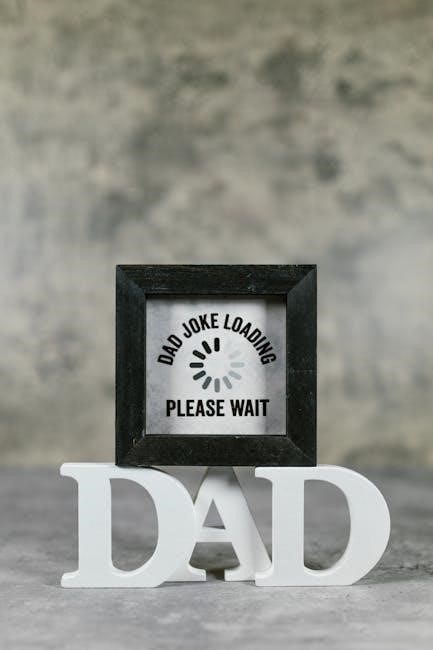Franz Kafka’s Letter to His Father is a profound and deeply emotional document, written in 1919, exploring his complex relationship with his father, Hermann Kafka.
This letter, available in PDF format, reveals Kafka’s inner turmoil, guilt, and resentment, offering insights into his psyche and literary legacy.
It stands as a significant work, blending personal struggle with literary genius, making it a essential read for understanding Kafka’s life and writing;
1.1 Overview of Franz Kafka’s Letter to His Father
Franz Kafka’s Letter to His Father is a deeply personal and emotionally charged document, written in November 1919, addressing his complex and strained relationship with Hermann Kafka.
Spanning over 100 manuscript pages, the letter is both a confession and an indictment, revealing Kafka’s feelings of guilt, resentment, and inadequacy.
It is a unique blend of psychological depth and literary artistry, offering insights into Kafka’s inner world and the familial dynamics that shaped his life and writing.
The letter, available in PDF format, remains a vital piece of literary history, bridging the gap between Kafka’s personal struggles and his creative genius.
1.2 Historical Context of the Letter
Franz Kafka wrote the Letter to His Father in November 1919, a period marked by personal and societal turmoil.
Post-World War I Europe was in flux, and Kafka faced health issues and professional instability, contributing to his emotional vulnerability.
The letter reflects the broader societal tensions and generational conflicts of the time, as well as Kafka’s internal struggles with identity and authority.
Historically, it captures the essence of a shifting world and the complexities of father-son relationships, making it a significant document of its era.
1.3 Importance of the Letter in Kafka’s Literary Legacy
Franz Kafka’s Letter to His Father holds immense significance in his literary legacy, offering unparalleled insight into his personal struggles and creative psyche.
As an autobiographical document, it bridges the gap between Kafka’s life and fiction, revealing themes of guilt, identity, and familial conflict that permeate his works.
The letter’s emotional depth and linguistic brilliance make it a standalone literary masterpiece, equal to his novels in artistic merit.
Its availability in PDF format ensures accessibility, allowing readers to explore Kafka’s inner world and connect his personal experiences to his iconic works like The Trial and The Castle.
Background and Historical Context
Franz Kafka wrote this letter in November 1919, addressing his father Hermann, though it remained unsent. The lengthy document, over a hundred pages, reflects their strained relationship and Kafka’s literary style.
2.1 Franz Kafka’s Relationship with His Father
Franz Kafka’s relationship with his father, Hermann Kafka, was fraught with tension and emotional distance. Hermann, a strong-willed businessman, often criticized Franz, instilling feelings of inadequacy and fear. Kafka, a sensitive child, felt overwhelmed by his father’s authoritative nature, which stifled his confidence. The loss of his younger brothers exacerbated Franz’s isolation, leaving him solely to endure Hermann’s strictness. This dynamic heavily influenced Kafka’s writing, as themes of authority and guilt appear prominently in his works. The letter to his father, though unsent, became a cathartic expression of Kafka’s lifelong emotional struggles and resentment.
2.2 The Family Dynamics and Their Impact on Kafka
The dysfunctional family dynamics deeply shaped Kafka’s psyche and literary themes. Hermann Kafka’s domineering presence and emotional distance created a household where fear and submission prevailed. Franz, as the eldest surviving son, bore the brunt of his father’s expectations and criticism. His sisters, born later, offered little relief, leaving Kafka isolated in his struggles. This oppressive environment fostered Kafka’s feelings of inadequacy and resentment, which he later expressed in his letter. The family’s rigid hierarchy and lack of emotional support significantly influenced Kafka’s writing, as themes of alienation, guilt, and the search for identity permeate his works.
2.3 The Timing and Circumstances of Writing the Letter
Franz Kafka wrote his letter to his father in November 1919, a period marked by personal turmoil and introspection. The letter was composed during a time when Kafka was grappling with his failing health and professional stagnation. His relationship with Milena Jesenská and his increasing awareness of his father’s emotional impact likely prompted this cathartic act. Kafka meticulously drafted the letter, ensuring it was both a personal reckoning and a literary masterpiece. Though intended for his father, Hermann Kafka never read it, leaving the document as a testament to Franz’s internal struggles and a window into his literary genius.

Themes and Emotional Depth
Franz Kafka’s letter to his father explores profound themes of guilt, resentment, and identity, revealing deep emotional scars and the struggle for independence from his father’s influence.
3.1 The Expression of Guilt and Resentment
Franz Kafka’s Letter to His Father is a poignant expression of guilt and resentment, revealing the deep emotional scars left by his father’s authoritarian and emotionally abusive behavior.
Kafka articulates his feelings of inadequacy and fear, stemming from his father’s intimidating presence and constant criticism, which shaped his childhood and adulthood alike.
The letter exposes Kafka’s internal conflict, as he struggles to reconcile his love for his father with the resentment harbored due to years of emotional distance and misunderstanding.
This emotional duality is central to the letter, offering a raw and unfiltered glimpse into Kafka’s psyche and his complex relationship with his father.
The intensity of these emotions underscores the letter’s significance as a personal and literary masterpiece, reflecting Kafka’s enduring inner turmoil.
3.2 The Struggle for Identity and Independence
Franz Kafka’s Letter to His Father vividly captures his lifelong struggle for identity and independence in the shadow of his dominating father, Hermann Kafka.
Kafka reflects on how his father’s overbearing nature stifled his personal growth, leaving him feeling powerless and incapable of asserting his own desires and ambitions.
The letter reveals Kafka’s quest to break free from his father’s influence, seeking validation and autonomy in his own life and writing.
This struggle is mirrored in his literary works, where themes of isolation and the search for self often prevail.
Kafka’s words paint a picture of a man torn between familial loyalty and the need to forge his own path in life.
3.3 The Theme of Emotional Abuse and Its Consequences
Franz Kafka’s Letter to His Father delves deeply into the emotional abuse he suffered at the hands of his father, Hermann Kafka, and its profound consequences.
Kafka vividly describes how his father’s constant criticism, authoritarian behavior, and emotional distance left him feeling inadequate and insecure.
The letter reveals the psychological scars of this abuse, including Kafka’s struggles with self-esteem, fear of authority, and inability to assert himself in personal and professional relationships.
Kafka’s writing often reflects these themes, as his characters grapple with feelings of isolation and powerlessness, mirroring his own experiences.
The emotional toll of this abuse is evident in Kafka’s lifelong quest for validation and his strained relationship with his father.

Literary Significance and Style
Franz Kafka’s Letter to His Father is a literary masterpiece, blending emotional depth with psychological complexity, written in Kafka’s unique, introspective style, both poetic and profound.
Its literary significance lies in its raw honesty and the use of symbolism, making it a key work for understanding Kafka’s writing techniques and thematic preoccupations.
4.1 The Letter as a Literary Work
Franz Kafka’s Letter to His Father is a remarkable literary work, standing apart from his fiction yet mirroring his signature style of psychological depth and emotional complexity.
Written in November 1919, the letter is a lengthy, intimate manuscript of over 100 pages, blending confession, accusation, and introspection, revealing Kafka’s inner world with raw honesty and poetic precision.
Its literary significance lies in its unique blend of personal and universal themes, making it a cornerstone for understanding Kafka’s emotional and creative struggles, as well as his broader literary legacy.
4.2 Kafka’s Unique Writing Style in the Letter
Kafka’s writing style in the Letter to His Father is characterized by its intense emotional candor, philosophical depth, and linguistic precision, mirroring his fictional works.
The letter employs a stream-of-consciousness narrative, blending accusation with self-reflection, creating a sense of immediacy and authenticity.
Kafka’s use of paradoxes, metaphors, and repetitive structures underscores the complexity of his feelings, making the letter both a personal document and a literary masterpiece.
4.3 The Use of Symbolism and Metaphor
Kafka’s Letter to His Father is rich with symbolism and metaphor, transforming a personal conflict into a universal exploration of power dynamics and emotional estrangement.
Figures like the “strong father” and the “weak son” serve as metaphors for broader societal and psychological struggles, while symbols of silence and distance illustrate the chasm between them.
Such literary devices elevate the letter beyond a private grievance, offering readers a profound meditation on identity, authority, and the human condition.

Psychological Insights
Franz Kafka’s Letter to His Father provides profound psychological insights into his mental state, revealing deep-seated guilt, resentment, and the emotional scars of a strained relationship.
The letter exposes Kafka’s struggle for identity and independence, highlighting the lasting impact of his father’s authoritarian behavior on his psyche and creative expression.
5.1 Kafka’s Mental State and Emotional Struggles
Franz Kafka’s Letter to His Father offers a raw glimpse into his mental state, revealing profound emotional struggles rooted in guilt, resentment, and a deep sense of inadequacy.
The letter underscores Kafka’s feelings of fragility and hostility, stemming from his father’s authoritarian and emotionally abusive behavior, which left lasting scars on his psyche.
Kafka’s writing reflects a fractured sense of identity, as he grapples with the impact of his father’s disapproval and the suffocating dynamics of their relationship, which shaped his inner turmoil.
The document serves as a cathartic expression of his pain, providing insights into the emotional complexities that defined much of his life and influenced his literary works.
5.2 The Role of the Father in Shaping Kafka’s Psyche
Franz Kafka’s father, Hermann, played a pivotal role in shaping his psyche, as evident in the Letter to His Father. Hermann’s authoritarian and emotionally abusive behavior instilled in Kafka a deep sense of inadequacy and fear.
The father’s disapproval and harsh expectations created a power imbalance, leaving Kafka feeling powerless and conflicted. This dynamic profoundly influenced Kafka’s self-perception, fostering feelings of guilt and a struggle for independence.
The letter reveals how Hermann’s dominance stifled Kafka’s emotional growth, leading to lifelong psychological scars and a fractured sense of identity.
5.3 The Letter as a Form of catharsis
5.3 The Letter as a Form of Catharsis
Franz Kafka’s Letter to His Father serves as a profound form of emotional catharsis, allowing Kafka to confront and express decades of suppressed feelings.
Through this letter, Kafka purges his inner turmoil, addressing the psychological wounds inflicted by his father’s authoritarian and emotionally abusive behavior.
The act of writing becomes a therapeutic release, enabling Kafka to process his guilt, resentment, and feelings of inadequacy, even though the letter was never sent.
This cathartic exercise not only provided personal relief but also influenced his literary style, infusing his works with themes of struggle and redemption.

The Letter’s Structure and Content
Franz Kafka’s letter to his father is a lengthy, detailed document, written in November 1919, spanning over 100 pages in its original manuscript form.
The letter is structured as a deeply personal and introspective monologue, addressing Hermann Kafka’s emotional abuse and its lasting impact on Franz’s life.
Available in PDF as part of bilingual editions, the letter offers a raw, unfiltered glimpse into Kafka’s psyche, revealing his struggles with identity and familial dynamics.
6.1 The Length and Detail of the Letter
Franz Kafka’s Letter to His Father is a remarkably lengthy document, comprising over 100 manuscript pages, making it one of the longest letters he ever wrote.
The letter is meticulously detailed, with Kafka recounting specific childhood memories and interactions with his father, Hermann, to illustrate his feelings of inadequacy and emotional distress.
Available in PDF formats, the letter’s extensive length and depth provide a comprehensive understanding of Kafka’s inner world, showcasing his literary mastery even in a personal context.
6.2 Key Passages and Their Significance
Franz Kafka’s Letter to His Father contains several poignant passages that highlight his deep-seated feelings of inadequacy and resentment towards his father, Hermann.
One key passage is Kafka’s description of his childhood, where he expresses feelings of fragility and fear, attributing them to his father’s overpowering presence and harsh behavior.
Another significant section is Kafka’s critique of his father’s emotionally abusive and hypocritical actions, which he argues stifled his personal growth and left lasting emotional scars.
These passages are crucial as they not only reveal Kafka’s inner turmoil but also provide a backdrop to the themes of guilt, identity, and struggle that permeate his literary works.
6.3 The Tone and Language Used
The tone of Kafka’s letter is deeply personal, oscillating between accusation, vulnerability, and resignation. He employs a formal yet emotionally charged language, reflecting the complexity of his relationship with his father.
Kafka’s use of vivid imagery and metaphors adds depth to his expressions of guilt and resentment, while his precise, almost clinical descriptions of childhood traumas underscore the letter’s emotional intensity.
Despite its confrontational nature, the letter maintains a reflective and introspective quality, showcasing Kafka’s literary mastery even in a deeply personal context. The language is both a weapon of accusation and a tool for self-exploration, blending anger with sorrow.

Reactions and Interpretations
Scholars and readers interpret the letter as a reflection of Kafka’s emotional struggles and its influence on his writing, with its PDF format enhancing accessibility for modern analysis.
7.1 Contemporary Reactions to the Letter
The letter has sparked intense discussion among modern scholars, who view it as a deeply personal and psychological document, offering insights into Kafka’s inner world.
Contemporary readers and critics often interpret the letter as a cathartic expression of Kafka’s lifelong emotional struggles, highlighting its emotional depth and literary significance.
The letter’s availability in PDF format has made it more accessible, allowing readers to engage with Kafka’s raw emotions and intellectual struggles in a direct and unfiltered manner.
Many see the letter as a bridge between Kafka’s personal life and his fictional works, providing a unique perspective on his writing and its underlying themes.
Overall, the letter remains a powerful and haunting document, resonating with readers and scholars alike, as it continues to shed light on Kafka’s complex psyche and literary genius.
7.2 Scholarly Interpretations and Analysis
Scholars widely regard Kafka’s letter as a pivotal document, offering unparalleled insight into his psychological state and familial dynamics.
Analysis often focuses on the letter’s themes of guilt, resentment, and the struggle for identity, which mirror elements of his fictional works.
The letter’s structure and language have been studied for their literary merit, with many noting its dense, introspective prose and emotional intensity.
Academics also explore the letter’s role in understanding Kafka’s broader oeuvre, connecting its personal themes to those of alienation and authority present in his novels.
Its availability in PDF has facilitated deeper textual analysis, enabling scholars to dissect Kafka’s nuanced expressions of conflict and emotional depth.
7.3 The Public’s Perception of the Letter
The public’s perception of Kafka’s letter is deeply emotional, with many readers connecting to its themes of family conflict and personal struggle.
Available in PDF format, the letter has reached a broad audience, sparking widespread discussion about its raw honesty and psychological depth.
Readers often describe it as a heartbreaking yet profound exploration of paternal relationships, resonating with those who have experienced similar family dynamics.
The letter’s accessibility online has further amplified its impact, allowing readers to engage with Kafka’s intimate thoughts and emotions in a deeply personal way.

Cultural and Historical Impact
Franz Kafka’s Letter to His Father has left an indelible mark on literature, influencing modern writers with its raw emotional depth and psychological complexity.
Available in PDF, it continues to inspire scholarly analysis and public reflection, solidifying Kafka’s legacy as a master of introspective storytelling.
This letter bridges personal and universal themes, making it a timeless piece in world literature, cherished for its authenticity and emotional resonance across generations.
8.1 The Letter’s Influence on Modern Literature
Franz Kafka’s Letter to His Father has profoundly influenced modern literature, offering a unique blend of psychological depth and emotional honesty. Its unflinching examination of family dynamics and personal trauma has inspired writers to explore similar themes in their work. The letter’s raw, introspective style has become a benchmark for authentic storytelling, resonating with authors grappling with identity and existential themes. Available in PDF, its accessibility has further amplified its impact, making it a cornerstone of literary studies and a timeless source of inspiration for contemporary writers seeking to explore the complexities of the human condition.
8.2 The Letter’s Role in Understanding Kafka’s Works
Franz Kafka’s Letter to His Father provides unparalleled insight into the emotional and psychological underpinnings of his literary works. The letter, spanning over 100 pages, reveals the profound impact of his relationship with his father on his writing. Themes of guilt, authority, and identity, central to his novels like The Trial and The Castle, are deeply rooted in the dynamics described in the letter. Available in PDF, this document serves as a bridge between Kafka’s personal life and his fiction, offering scholars and readers a unique lens to interpret his works and understand the psychological complexities that shaped his creative genius.
8.3 The Letter’s Place in the Canon of World Literature
Franz Kafka’s Letter to His Father holds a significant position in world literature, transcending its personal nature to become a universal exploration of familial dynamics and existential struggles. Widely studied in its PDF form, the letter is celebrated for its raw emotional depth and literary brilliance. It not only complements Kafka’s fictional works but also stands independently as a masterpiece of confessional writing. Scholars and readers alike recognize its enduring relevance, placing it alongside other seminal texts that explore the human condition. The letter’s inclusion in literary canons underscores its lasting influence and its ability to resonate across cultures and generations.

The PDF Version and Accessibility
The PDF version of Kafka’s letter is widely accessible online, offering readers convenience and global reach. Its digital format ensures ease of reading and sharing, preserving Kafka’s profound words for future generations while maintaining the integrity of his original intent.
9.1 The Availability of the Letter in PDF Format
Franz Kafka’s Letter to His Father is readily available in PDF format, accessible through various online platforms and literary archives. The digital version ensures easy access, allowing readers worldwide to explore Kafka’s heartfelt and introspective words. The PDF format faithfully reproduces the original letter’s content, maintaining its emotional depth and literary significance. Many websites offer free downloads, making it a convenient resource for scholars and enthusiasts alike. Additionally, bilingual editions and translations are available, further enhancing its accessibility to a global audience. This digital preservation ensures Kafka’s poignant letter remains a vital and accessible literary treasure for future generations.
9.2 The Convenience of Digital Access
Digital access to Kafka’s Letter to His Father in PDF format offers unparalleled convenience for readers. The letter can be downloaded and read on various devices, including e-readers, tablets, and smartphones, making it portable and easily accessible. This digital availability eliminates the need for physical copies, allowing instant access to Kafka’s profound reflections. Additionally, digital versions often include search functions and adjustable font sizes, enhancing readability. The convenience of digital access has democratized Kafka’s work, ensuring that this deeply personal and significant letter reaches a broader audience worldwide. This accessibility fosters a deeper engagement with Kafka’s literary legacy.
9.3 The Challenges of Translating the Letter into Digital Formats
Converting Kafka’s Letter to His Father into digital formats presents several challenges. The letter’s original manuscript is handwritten, requiring meticulous transcription to preserve its emotional depth and linguistic nuances. Ensuring accuracy in translation from German to other languages while maintaining Kafka’s unique voice is another hurdle. Additionally, the digital conversion must retain the original’s formatting and structure, as any alteration could distort the intended meaning. Tools like CloudConvert facilitate the transition between formats such as EPUB and PDF, but human oversight remains crucial to uphold the integrity of this literary masterpiece. These challenges highlight the complexity of digitizing sensitive textual works.
Franz Kafka’s Letter to His Father remains a profound exploration of familial conflict and emotional depth, offering lasting insights into Kafka’s psyche and literary genius. Available in PDF, it continues to resonate with readers, bridging past and present through its universal themes of identity and struggle.
10.1 The Letter’s Lasting Legacy
Franz Kafka’s Letter to His Father has left an enduring impact on literature and psychology, offering profound insights into familial dynamics and emotional trauma. Its availability in PDF ensures accessibility for modern readers, preserving Kafka’s raw emotional expression. The letter’s exploration of guilt, identity, and abuse continues to resonate, influencing both literary studies and psychological understanding. As a testament to Kafka’s inner struggles, it remains a vital piece in his literary legacy, bridging past and present. Scholars and readers alike find it indispensable for grasping Kafka’s oeuvre, cementing its place in the canon of world literature.
10.2 The Continued Relevance of Kafka’s Letter
Franz Kafka’s Letter to His Father remains remarkably relevant today, offering timeless insights into family dynamics, emotional struggles, and the quest for identity. Its exploration of guilt, resentment, and the complexities of paternal relationships continues to resonate with readers. The letter’s psychological depth and literary brilliance make it a cornerstone for understanding Kafka’s works and modern existential themes. Available in PDF, it ensures accessibility for new generations, allowing scholars and readers to explore its universal themes. Its relevance endures as a powerful reflection of human emotion and familial conflict, transcending time and cultural boundaries.
10.3 Final Thoughts on the Letter’s Significance
Franz Kafka’s Letter to His Father is a monumental work, not only for its emotional intensity but also for its literary and psychological significance. It captures the essence of Kafka’s inner world, revealing the profound impact of his relationship with his father on his writing and identity. The letter’s availability in PDF ensures its preservation and accessibility, allowing future generations to grapple with its themes of guilt, resentment, and the search for understanding. As a literary artifact, it bridges the personal and universal, offering enduring insights into the human condition and cementing its place as a vital piece of world literature.
